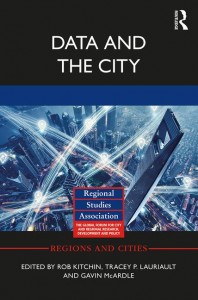 A new book – Data and the City – edited by Rob Kitchin, Tracey Lauriault and Gavin McArdle has been published by Routledge as part of the Regions and Cities series. The book is one of the outputs from a Progcity workshop in late 2015.
A new book – Data and the City – edited by Rob Kitchin, Tracey Lauriault and Gavin McArdle has been published by Routledge as part of the Regions and Cities series. The book is one of the outputs from a Progcity workshop in late 2015.
Description
There is a long history of governments, businesses, science and citizens producing and utilizing data in order to monitor, regulate, profit from and make sense of the urban world. Recently, we have entered the age of big data, and now many aspects of everyday urban life are being captured as data and city management is mediated through data-driven technologies.
Data and the City is the first edited collection to provide an interdisciplinary analysis of how this new era of urban big data is reshaping how we come to know and govern cities, and the implications of such a transformation. This book looks at the creation of real-time cities and data-driven urbanism and considers the relationships at play. By taking a philosophical, political, practical and technical approach to urban data, the authors analyse the ways in which data is produced and framed within socio-technical systems. They then examine the constellation of existing and emerging urban data technologies. The volume concludes by considering the social and political ramifications of data-driven urbanism, questioning whom it serves and for what ends. It will be crucial reading for those who wish to understand and conceptualize urban big data, data-driven urbanism and the development of smart cities.
The book includes chapters by Martijn De Waal, Mike Batty, Teresa Scassa, Jim Thatcher and Craig Dalton, Jim Merricks White, Dietmar Offenhuber, Pouria Amirian and Anahid Bassiri, Chris Speed Deborah Maxwell and Larissa Pschetz, Till Straube, Jo Bates, Evelyn Ruppert, Muki Haklay, as well as the editors.
Data and the City is available in both paperback and hardback and is a companion volume to Code and the City published last year.
